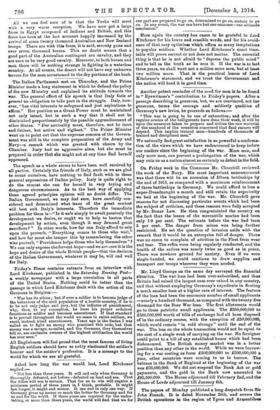Mr. Lloyd George on the same day surveyed the financial
situation. The war loan had been over-subscribed, and thus Britain had raised the largest sum ever raised in any country, and that without employing Germany's expedients in floating a much smaller loan at a higher rate of interest. The feature of the loan had been the enormous number of small applicants —nearly a hundred thousand, as compared with the twenty-five thousand for the Boer War loan. The first allotments would go to these patriotic small applicants. The £350,000,000 to £500,000,000 worth of bills of exchange had all been disposed of in the ordinary course, with the exception of £50,000,000, which would remain " in cold storage" until the end of the war. The loss on the whole transaction would not be equal to the cost of a single week of carrying on the war. No foreigner could point to a bill of any established house which had been dishonoured. The British money market was in a better position than any other in the world. While we were borrow- ing for a war costing us from £300,000,000 to £500,000,000 a year, other countries were coming to us to borrow. The balance in the Bank of England at the beginning of the war was £26,000,000. We did not suspend the Bank Act or gold payments, and the gold in the Bank now amounted to £85,500,000. The House adjourned till February 2nd, and the House of Lords adjourned till January 6th.


























































 Previous page
Previous page